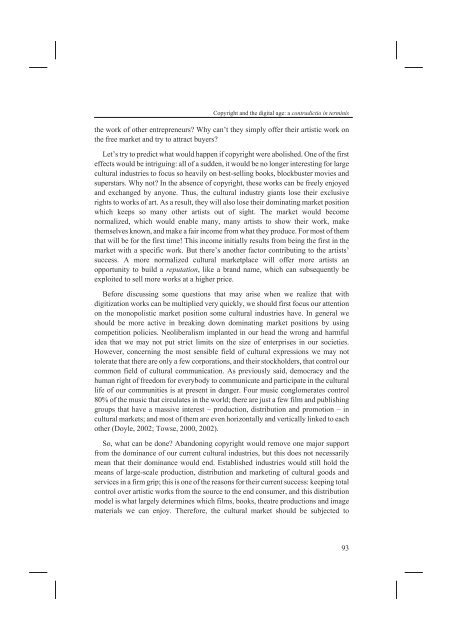D:\Documents and Settings\Ana\My Documents\Biserka-knjiga ...
D:\Documents and Settings\Ana\My Documents\Biserka-knjiga ...
D:\Documents and Settings\Ana\My Documents\Biserka-knjiga ...
You also want an ePaper? Increase the reach of your titles
YUMPU automatically turns print PDFs into web optimized ePapers that Google loves.
Copyright <strong>and</strong> the digital age: a contradictio in terminis<br />
the work of other entrepreneurs? Why can’t they simply offer their artistic work on<br />
the free market <strong>and</strong> try to attract buyers?<br />
Let’s try to predict what would happen if copyright were abolished. One of the first<br />
effects would be intriguing: all of a sudden, it would be no longer interesting for large<br />
cultural industries to focus so heavily on best-selling books, blockbuster movies <strong>and</strong><br />
superstars. Why not? In the absence of copyright, these works can be freely enjoyed<br />
<strong>and</strong> exchanged by anyone. Thus, the cultural industry giants lose their exclusive<br />
rights to works of art. As a result, they will also lose their dominating market position<br />
which keeps so many other artists out of sight. The market would become<br />
normalized, which would enable many, many artists to show their work, make<br />
themselves known, <strong>and</strong> make a fair income from what they produce. For most of them<br />
that will be for the first time! This income initially results from being the first in the<br />
market with a specific work. But there’s another factor contributing to the artists’<br />
success. A more normalized cultural marketplace will offer more artists an<br />
opportunity to build a reputation, like a br<strong>and</strong> name, which can subsequently be<br />
exploited to sell more works at a higher price.<br />
Before discussing some questions that may arise when we realize that with<br />
digitization works can be multiplied very quickly, we should first focus our attention<br />
on the monopolistic market position some cultural industries have. In general we<br />
should be more active in breaking down dominating market positions by using<br />
competition policies. Neoliberalism implanted in our head the wrong <strong>and</strong> harmful<br />
idea that we may not put strict limits on the size of enterprises in our societies.<br />
However, concerning the most sensible field of cultural expressions we may not<br />
tolerate that there are only a few corporations, <strong>and</strong> their stockholders, that control our<br />
common field of cultural communication. As previously said, democracy <strong>and</strong> the<br />
human right of freedom for everybody to communicate <strong>and</strong> participate in the cultural<br />
life of our communities is at present in danger. Four music conglomerates control<br />
80% of the music that circulates in the world; there are just a few film <strong>and</strong> publishing<br />
groups that have a massive interest – production, distribution <strong>and</strong> promotion – in<br />
cultural markets; <strong>and</strong> most of them are even horizontally <strong>and</strong> vertically linked to each<br />
other (Doyle, 2002; Towse, 2000, 2002).<br />
So, what can be done? Ab<strong>and</strong>oning copyright would remove one major support<br />
from the dominance of our current cultural industries, but this does not necessarily<br />
mean that their dominance would end. Established industries would still hold the<br />
means of large-scale production, distribution <strong>and</strong> marketing of cultural goods <strong>and</strong><br />
services in a firm grip; this is one of the reasons for their current success: keeping total<br />
control over artistic works from the source to the end consumer, <strong>and</strong> this distribution<br />
model is what largely determines which films, books, theatre productions <strong>and</strong> image<br />
materials we can enjoy. Therefore, the cultural market should be subjected to<br />
93



